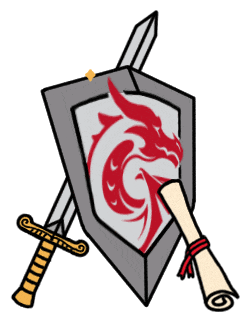Selecting the right degree program is an important step in your academic journey at DigiPen. The program you select will be an important factor in everything from your application requirements and the classes you’ll take to your career path after graduation.
Discover Your Path!
Embark on our interactive Degree Quest to find out which DigiPen program may best align with your interests.
Venture Forth!
Why do you need to select your degree program from the start? In short, our programs are extremely focused and comprehensive by design. Courses at DigiPen are cumulative, meaning that each lesson you learn builds off the previous one. In order to graduate at an expert level in your area of study, you’ll need to start building your base of knowledge from day one. Once you’ve learned the fundamentals for your specific area of interest, you’ll dive into advanced subjects and undertake projects that will form the foundation of your professional portfolio.
If you’ve explored DigiPen’s degrees online but you’re still not sure which program might be right for you, the best way to learn more is to visit our campus in Redmond, Washington, or reach out to our Admissions staff. Whether you’re local or you live across the country, you can visit DigiPen in person or remotely to learn more about specific programs from our friendly community of faculty, alumni, and current students.
Undergraduate Degree Programs at DigiPen
Our eight undergraduate programs fall into five general categories.
This program covers a wide range of important computer science topics — such as networks, compilers, and parallel programming — and their modern-day applications. You’ll also have the opportunity to apply your knowledge towards team-based software engineering projects.
DigiPen’s machine learning focused degree program teaches you how to develop software, analyze, and make sense of data input. As a graduate of the program, you will be well-versed in data science and software engineering — prepared to tackle real-world problems with machine learning solutions.
This rigorous program for aspiring digital artists begins with the fundamentals of artistry and culminates in advanced projects creating high-quality games or animated films. By the end of the program, you will have a deep understanding of the production pipelines used in the professional industries.
This interdisciplinary degree combines coursework in game design theory, the humanities, and social sciences. Students learn the skills necessary to craft engaging and meaningful experiences for all types of games, applications, and other interactive media.
This degree prepares you for a career as a hybrid engineer and designer, versed in both computer programming and game design. You’ll be a versatile asset on any professional software development team.
DigiPen’s rigorous flagship degree program provides a foundation in the math, physics, and computer science that go into games and graphical simulations, making this an excellent program for aspiring game and software developers.
Want to create music and sophisticated soundscapes for games, VR, film, and other digital media? This degree combines foundational music coursework — including music history, theory, composition, and performance — with practical training in studio recording and sound design.
In this program, you’ll study software engineering and learn to develop digital audio systems for video games and interactive media. You’ll also learn about studio recording techniques, sound design, and music theory.
Graduate Degree Programs at DigiPen
Our two graduate degree programs are split between computer science and digital art.
Computer Science Degree
For students and professionals with a prior degree, our full-time Master of Science in Computer Science program further advances your knowledge of 3D computer graphics, artificial intelligence, and advanced algorithms.
Digital Art and Animation Degree
This terminal degree program builds on your artistic foundation as a professional artist. As an MFA candidate, you will hone your craft in digital media, focus on new areas of specialization, and create outstanding work that exemplifies your own artistic voice. This program culminates in an individual thesis project.
Accelerated Schedules at DigiPen
Complete an undergraduate degree followed by a graduate degree in a shorter duration through an accelerated schedule.
BS/MS Accelerated Schedule
Students in select undergraduate degree programs have the option to pair their degree with a shortened MS in Computer Science program by taking graduate-level courses in their junior and senior years. Eligible degrees include the BS in Computer Science, the BS in Computer Science in Artificial Intelligence, and the BS in Computer Science in Real-Time Interactive Simulation.


